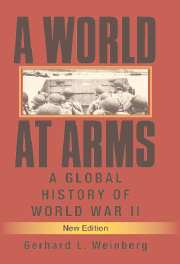Book contents
- Frontmatter
- Dedication
- Contents
- List of Maps
- Preface to the New Edition
- Preface to the First Edition
- List of Abbreviations
- Introduction
- 1 From one War to Another
- 2 From the German and Soviet Invasions of Poland to the German Attack in the West, September I, 1939 to May 10, 1940
- 3 The world Turned Upside Down
- 4 The Expanding Conflict, 1940-1941
- 5 The Eastern Front and a Changing War, June to December, 1941
- 6 Halting the Japanese Advance, Halting the German Advance; Keeping Them Apart and Shifting the Balance: December 1941 to November 1942
- 7 The War At Sea, 1942-1944, and the Blockade
- 8 The War in Europe and North Africa 1942-1943: to and from Stalingrad; to and from Tunis
- 9 The Home Front
- 10 Means of Warfare: Old and New
- 11 From the Spring of 1943 to Summer 1944
- 12 The Assault on Germany from All Sides
- 13 Tensions in Both Alliances
- 14 The Halt on the European Fronts
- 15 The Final Assault on Germany
- 16 The War in the Pacific: From Leyte to the Missouri
- Conclusions: the Cost and Impact of War
- Bibliographic Essay
- Notes
- Maps
- Index
Conclusions: the Cost and Impact of War
Published online by Cambridge University Press: 05 February 2014
- Frontmatter
- Dedication
- Contents
- List of Maps
- Preface to the New Edition
- Preface to the First Edition
- List of Abbreviations
- Introduction
- 1 From one War to Another
- 2 From the German and Soviet Invasions of Poland to the German Attack in the West, September I, 1939 to May 10, 1940
- 3 The world Turned Upside Down
- 4 The Expanding Conflict, 1940-1941
- 5 The Eastern Front and a Changing War, June to December, 1941
- 6 Halting the Japanese Advance, Halting the German Advance; Keeping Them Apart and Shifting the Balance: December 1941 to November 1942
- 7 The War At Sea, 1942-1944, and the Blockade
- 8 The War in Europe and North Africa 1942-1943: to and from Stalingrad; to and from Tunis
- 9 The Home Front
- 10 Means of Warfare: Old and New
- 11 From the Spring of 1943 to Summer 1944
- 12 The Assault on Germany from All Sides
- 13 Tensions in Both Alliances
- 14 The Halt on the European Fronts
- 15 The Final Assault on Germany
- 16 The War in the Pacific: From Leyte to the Missouri
- Conclusions: the Cost and Impact of War
- Bibliographic Essay
- Notes
- Maps
- Index
Summary
When the war in the Pacific ended with the Japanese surrender, the fighting in Europe had been over for more than four months. In both areas, peace was accompanied by turmoil. In East Asia, the stages of Japanese forces surrendering in widely scattered areas from Burma to New Guinea, from Luzon to Java,were a lengthy and complicated process, and one followed soon after by new troubles between local nationalist groups and returning colonial powers. Only in Japan itself, ironically, was there a real peace at a time when China was about to dissolve in renewed—or continued—civil war. But everywhere there was at least a sense of hope that, with the end of the fighting, things would somehow be better.
The world looked back on years of fighting which had caused enormous casualties and vast destruction. The Soviet Union had suffered the largest number of deaths. Earlier estimates of 20 million, which were occasionally derided as too high, now turn out to have been too low. New research growing out of the more open atmosphere in recent years has been pointing to figures closer to, and possibly in excess of, 25 million deaths. Of these, at most one-third were military, thus demonstrating in this case what was true for the war as a whole: the civilian casualties exceeded the military. Chinese casualties are much more difficult to estimate than those of the Soviet Union, but 15 million dead is a reasonable approximation. In Poland, close to 6 million lost their lives, while Yugoslavia suffered between 1.5 and 2 million deaths. About 400,000 United Kingdom soldiers and civilians lost their lives; about 300,000 from the United States. Germany lost over 4 million and Japan over 2 million lives in the war. The total for the globe as a whole probably reached 60 million, a figure which includes the six million murdered because they were Jewish.
At the war's end, the movement of people caused by the great upheaval did not come to a halt. Millions had been displaced as refugees or deportees, and many of them found it difficult or impossible to go home.
- Type
- Chapter
- Information
- A World at ArmsA Global History of World War II, pp. 894 - 920Publisher: Cambridge University PressPrint publication year: 2005



